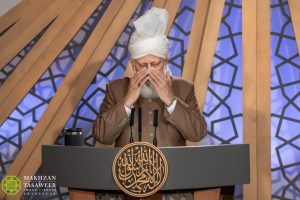
Khalida Jamilah, USA
I moved to the United States from Indonesia when I was fifteen years old. Just like many immigrant children, the question of a new identity arises. In my mind, I often wondered: Am I a genuine American? I already look different with my hijab, modest attire, heavy Indonesian accent, and the colour of my skin. I certainly do not look like the stereotypical blue-eyed and blonde-haired representation of American women in media and Hollywood movies shown to the rest of the world. I was worried that my friends and the people around me thought I was an outsider and that I could never be considered a ‘true American’. I once thought that I should practice really hard to eliminate my Indonesian accent so I could speak English ‘properly’ and get American people to respect me.
I also had problems if I defined myself as an Indonesian-American Muslim. That hyphenated way of identifying myself is problematic because if I put ‘Indonesian’ first, I was worried that people might think I was not a true American or that I’m just a foreigner who doesn’t love America. If I put ‘American’ first, I was worried my Indonesian friends and family would think that I was neglecting my Indonesian heritage. If I only defined myself as a Muslim, I was afraid people would think of me as an outsider or a terrorist.
It was not until that one lecture in my university I realized how I should define my identity. That day, the lecture was about cosmopolitanism. The simple definition of cosmopolitanism is that all people are citizens of the world. Despite our different beliefs, looks, languages, we belong to one single community and should care for each other. I remember my professor explaining that although we live in America we should know what is happening in India and we should care about the struggle of Indian citizens and feel their problems as our own. When I heard this from my professor, I had a light-bulb moment. I automatically thought that this sounded like Islam. That example was like a hadith that says a believer is like one body. When one part hurts, the other parts will hurt too. More specifically, cosmopolitanism is similar to what I’ve been experiencing as an Ahmadi. For example, whenever I go, if I meet another Ahmadi, I feel I have a family although we are not biologically related. Ahmadiyyat is a strong support system for all its followers regardless of the colour of their skin or their social status.
Ahmadi Muslims around the world are united under one spiritual leader, Hazrat Mirza Masroor Ahmad Khalifatul Masih V (aba), the successor to the Promised Messiah and Imam Mahdi (as). It doesn’t matter what skin colour you have, where you live, what foods you eat and what languages you speak. Every Ahmadi in every part of the world is taught to be the best version of themselves and become a useful member of society wherever they live. We are taught that the true purpose of life is to worship Allah and do good deeds. We are taught to achieve the high purpose of our creation and our existence. Being an Ahmadi is the cure to my identity crisis. I focus more on how to do good in society with my skills and knowledge. I should strive hard to become a good person. When I focus on my self-development, then all of those worrisome questions disappear.
Being an Ahmadi you can be Native American, European, African, Chinese, Indonesian, Arab and so on. I can guarantee there will be no identity crisis if one truly follows its teachings. Now I am still embracing my Indonesian culture. I speak the language, eat the foods and watch the latest news and social media trends. But it does not make me less American because Ahmadiyyat teaches me to value American identity such as freedom and individuality (characters or mindset that make a person unique). Ahmadiyyat teaches me to be loyal to the country that I live in. With this mindset, I feel a sense of belonging and not like I’m an outsider.
Through Ahmadiyyat I can practice cosmopolitanism in a more meaningful way. Being a citizen of the world does not mean anything if I do not bring a positive impact to the people around me. Through Ahmadiyyat I learned that I should become the best version of myself and contribute to the advancement of the country I live in. I hope that more people will embrace this mindset and put it into practice so that peace can exist at all levels of society.
Moreover, one verse from the Holy Qur’an teaches me that different races, different languages, different foods are good because we can appreciate one another, learn from each other and this learning process enriches our life experience. When we focus on the positive side of life and appreciate our differences, there will be no hatred and prejudice. Thus, learning about other people’s identities is a good thing for our self-development.
Although there will be people who still think I am not American enough because I wear the hijab, modest attire and have an Indonesian accent, I care less about them because now I focus on strengthening my identity to become a valuable member of society. Now I am not confused anymore whether I am American enough or not because one important aspect of American identity is having freedom. If I feel inferior because I am wearing a hijab, then I am not free. Islam teaches me that true freedom is when I stand strong even if the whole world might mock me just because I look different and have different points of view.
Thus, being an Ahmadi Muslim solves my identity crisis. It makes me a stronger and better world citizen. Through Islam, I understand that different cultures exist so we can appreciate and learn from one another. Now I am proud of my unique identity. Now I no longer worry what people think about me. As Peter Marshall said, ‘May we think of freedom not as the right to do as we please, but as an opportunity to do what is right.’
As an Ahmadi I feel freedom in its true sense.

© Shutterstock
About the Author: Born and raised in Indonesia, Khalida Jamilah is a freelance writer and an aspiring journalist. Now she proudly claims California as her home. She graduated with a BA in Peace and Conflict Studies from the University of California Berkeley. Her interests are Islam’s response to contemporary issues and world cultures.




Add Comment